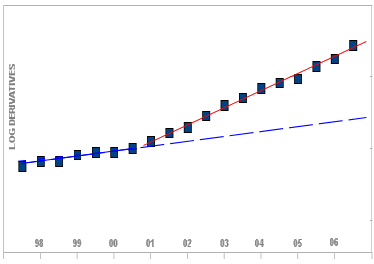Given that the United States has held itself up as a global economic model, the change could shift the balance of how governments around the globe conduct free enterprise. Over the past three decades, the United States led the crusade to persuade much of the world, especially developing countries, to lift the heavy hand of government from finance and industry. But the hands-off brand of capitalism in the United States is now being blamed for the easy credit that sickened the housing market and allowed a freewheeling Wall Street to create a pool of toxic investments that has infected the global financial system. Heavy intervention by the government, critics say, is further robbing Washington of the moral authority to spread the gospel of laissez-faire capitalism…
"People around the world once admired us for our economy, and we told them if you wanted to be like us, here’s what you have to do – hand over power to the market," said Joseph Stiglitz, the Nobel Prize-winning economist at Columbia University. "The point now is that no one has respect for that kind of model anymore given this crisis. And of course it raises questions about our credibility. Everyone feels they are suffering now because of us…
 When you enter a Casino in Las Vegas to gamble, you buy chips that have a monetary value. As you leave, you sell your chips and receive money. If you’ve lost chips in the process, too bad for you. If you’ve won chips, it’s been a good night. But nobody’s gambling on the value of chips – they hold their worth over the evening. And what about credit? It flows like a river, if it’s secured. Unsecured credit in a Casino? Not likely. "We want your money, if you’ve got any money. If you don’t, have any money, what in the hell are you doing in here?"
When you enter a Casino in Las Vegas to gamble, you buy chips that have a monetary value. As you leave, you sell your chips and receive money. If you’ve lost chips in the process, too bad for you. If you’ve won chips, it’s been a good night. But nobody’s gambling on the value of chips – they hold their worth over the evening. And what about credit? It flows like a river, if it’s secured. Unsecured credit in a Casino? Not likely. "We want your money, if you’ve got any money. If you don’t, have any money, what in the hell are you doing in here?"

“Not only have individual financial institutions become less vulnerable to shocks from underlying risk factors, but also the financial system as a whole has become more resilient.” — Alan Greenspan in 2004
What’s going away today, in other words, is not “American Capitalism” but a doctrine of pure laissez-faire capitalism that was deeply flawed and not in keeping with the traditionally American approach to markets. We are coming back to how we historically did business. And I am persuaded that we will be far better off with a less doctrinaire approach.

One who did understand the risks and warned about it was New York Times columnist and Princeton Economics professor Paul Krugman.
He has just been awarded the Nobel Prize for Economics.